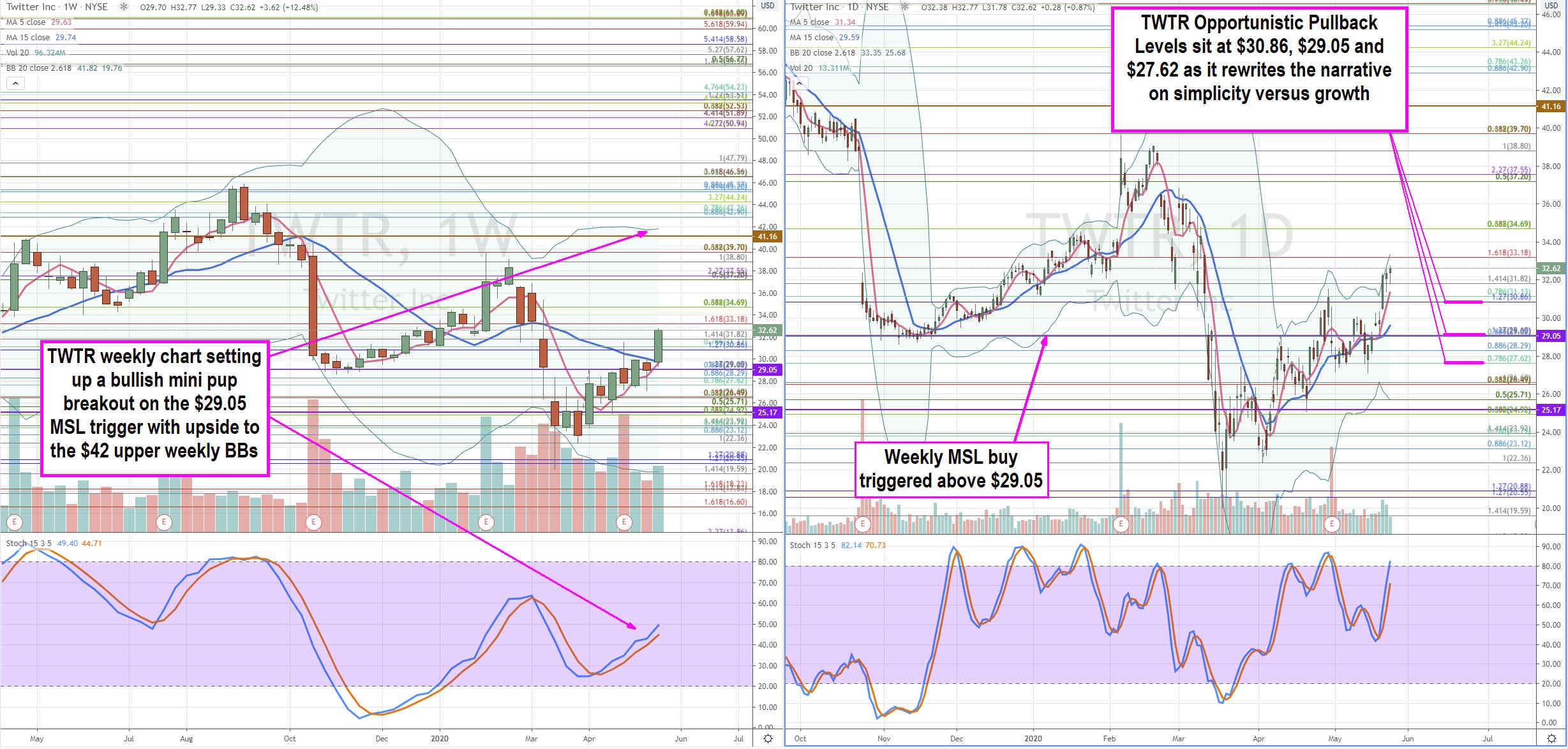Legacy social media platform
Twitter (NASDAQ: TWTR) shares have been chopping in a multi-year range as its metrics slip just before breaking out and improve before breaking down. Wall Street continues to curve fit a viable narrative to justify higher valuations. After all, Twitter is arguably the second most well-known social media platform behind
Facebook (NYSE: FB) which has managed to accelerate to new all-time highs deflecting government scrutiny and the impacts of the COVID-19 pandemic. Meanwhile, Twitter has remained mostly stagnant for nearly a decade since creating the tweet bird logo in 2012. Luckily for Twitter, the higher Facebook shares rise, the more interest builds for the distant number two platform. Facebook raises the valuation bar for social media platforms and drags Twitter along for the ride, hare, and tortoise. Long-term investors may want to pay attention as TWTR attempts to breakout of the range again as its own valuation paradox seems to be rewriting the playbook on the race for innovation versus maintaining simplicity and stability.
The Twitter Paradox
In the internet space, companies must constantly stay on the cutting age of innovation to remain competitive. A look at past leaders like Netscape (browsers), Yahoo.com (search engines), AOL Online (social media) and Infospace (social media) are cautionary tales of companies that dominated their piece of the internet pie only to get tossed into oblivion by the innovators like Google (NASDAQ: GOOGL) , Amazon (NASDAQ: AMZN) and Facebook. Yet, how does a company like Twitter continue to remain relevant despite lack of meaningful innovation. The site is literally identical to itself from nearly a decade ago. How is it not the Blockbuster Video of social media? It’s as if the laws of innovation and time stop dead in its tracks when it comes to Twitter. Twitter is unobtrusive and un-intrusive.
A Platform About ‘Nothing’
Twitter reminds me the Seinfeld Show, which claims it’s a show about ‘nothing’. What makes Twitter relevant is not Twitter, but the content. Twitter is a network that distributes content in an unobtrusive manner. Whether it’s controversial tweets from the U.S. President and world leaders to breaking firsthand coverage of an event, Twitter gets the content quicker than anyone. This is the essence of big data, which was once a narrative for acquisition. This may arise again as prices accelerate.
Q1 2020 (Lack of) Earnings
Twitter reported their Q2 fiscal year 2020 for the quarter ending March 2020. The Company reported a loss of (-$0.01) per share versus consensus analyst estimates for a profit of $0.11 per share, missing estimates by (-$0.12). Revenues rose to $806.6 million versus $773.08 million, up 2.5% YoY. The only significant update was there will be no further guidance due to uncertainties stemming from the impact of COVID-19. They do expect stock-based compensation to grow by 25% in Q2 2020. It’s no wonder the bears are perpetually tempted to short shares. However, they will be the ones to push prices higher with short covering.
Slow and Steady Wins Second Place
Twitter’s lack of innovation can also underscore the narrative for simplicity, convenience and stability galvanizing its deeply entrenched user base. The Company has undergone thorough a cleansing of its user base of fake accounts and bots, which ultimately is a positive, despite having MAU numbers initially hit. Twitter is the go-to content distribution network composed of engaged users that may take breaks for months and return to the same mechanics. Nothing has changed drastically and there’s nothing new to learn to operate the basic functions. There’s comfort in stability. Slow and steady wins the race… maybe not wins, but there’s always others willing to acquire the lead through acquisition. The barriers to entry are high and getting higher by the day to establish a user base as large as Twitter.

Opportunistic Buy Levels
Using the rifle charts on the wider weekly and daily time frames to lay out the playing field is suitable for swing traders and investors. TWTR is forming a weekly mini pup after triggers the weekly market structure low (MSL) buy trigger above $29.05. The next key resistance sits at the $33.18 Fibonacci (fib) level. If the daily stochastic can peak out at the $34.69 gatekeeper fib, then opportunistic pullback entry levels sit at $$30.86 fib, $29.05 weekly MSL trigger and the $27.62 fib. EU privacy crackdown regulation measures may help trigger a pullback catalyst. Traders can use these and in-between fib levels to scalp reversions utilizing stochastic direction confluence on intraday time frames. Swing traders can scale for overnight to multi-day holds on low band daily stochastic. Long-term investors may consider a dollar-cost averaging approach with income generation through writing covered calls.
Before you make your next trade, you'll want to hear this.
MarketBeat keeps track of Wall Street's top-rated and best performing research analysts and the stocks they recommend to their clients on a daily basis.
Our team has identified the five stocks that top analysts are quietly whispering to their clients to buy now before the broader market catches on... and none of the big name stocks were on the list.
They believe these five stocks are the five best companies for investors to buy now...
See The Five Stocks Here
Thinking about investing in Meta, Roblox, or Unity? Enter your email to learn what streetwise investors need to know about the metaverse and public markets before making an investment.
Get This Free Report
Like this article? Share it with a colleague.
Link copied to clipboard.